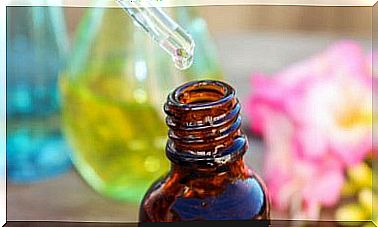What Is Retinol For?
The vast majority of cosmetic skin care creams have retinol, a derivative of vitamin A, as their main active ingredient . Together with its metabolites, such as tretinine, retinal, alitretinoin and isotretinoin, they make up the group of retinoids. first generation.
They are applied topically to the skin to treat and reduce wrinkles. In this way, it is intended to reduce the signs of photochronous aging. You want to know more? Continue reading!
What is retinol?
Retinol and retinoic acid have the same biological characteristics as vitamin A. Therefore, they are not synthesized in the body and must be supplied through the diet or exogenously.
This substance does not have a characteristic biological effect on tissues, but it is transformed into its active metabolite. It must be metabolized by the body itself into other compounds, such as the following:
- Retinyl esters.
- 14-retro retinol.
- 3,4-didehydroretinol all trans.
- All trans retinoic acid.

You may be interested: What are retinol creams for?
Retinol benefits
Retinoids were introduced in the treatment of dermatoses, including photoaging, more than two decades ago. Combination therapy is well established for skin disorders such as acne and psoriasis.
Anti-aging
Retinoids are the most promising agents that are available for the treatment of aging. Among the retinoids, tretinoin is the most potent and best studied.
However, its irritating potential has led dermatologists to switch to less irritating but comparatively effective retinoids, such as adapalene. To a certain extent, also retinaldehyde.
Seboregulator
Retinoids decrease the activity of the enzymes involved in lipogenesis. They block the differentiation and cell division of sebocytes (sebum-forming cells).
The regulation of sebum secretion within the ducts of the sebaceous glands causes the retinoids to produce an anti-comedogenic effect. This is important in acne, especially in those more serious varieties that are characterized by lesions with a lot of pus.
Treatment of premalignant lesions
Topical isotretinoin has been evaluated for the treatment of actinic keratoses. The Journal of the American Academy of Dermatology conducted a study that involved the use of 0.1% isotretinoin cream twice daily for 24 weeks.
The research resulted in a significant reduction in actinic keratoses and precancerous facial lesions in the isotretinoin group. 66% of the 44 patients achieved a decrease in more than a third of the disorder.
Depigmenting
In pigmentation problems, topical retinoids lighten hyperpigmented lesions by inhibiting the transfer of melanosomes to keratinocytes. Thus, the pigmentation of the most superficial layer of the skin is reduced by accelerating the turnover of epidermal cells.
The British Journal of Dermatology concluded that 0.1% tretinoin cream improves pigmentation in melasma patients, with a significant clinical lightening effect. They reduce discoloration of the skin, decrease its pigmentation by approximately 60% and contribute to a correct distribution of melanin throughout the tissue.
Read also: Hyperpigmentation: why does it happen?
Acne treatment
As we already anticipated, retinoids play a central role in the treatment of acne. They have been shown to reduce visible lesions and also inhibit the development of microcomedones and new lesions.
In addition to affecting primary acne lesions, they also act on secondary lesions, including scarring and pigmentation, due to actions in the dermis. There are different levels of affectation by the pathology, so a health professional must determine in which cases the prescription is useful.

Stimulates collagen formation
Retinol has been shown to have positive effects, not only on extrinsic skin aging, but also intrinsic skin aging. It has a strong positive effect on collagen metabolism. Retinol stimulates fibroblasts to synthesize fibers, which increase in number.
Collagen weakens and reduces its presence as we age. Hence, in terms of beauty and personal care, a solution to this degradation is sought. Well, retinoid creams come to help in this regard.
Antioxidant
Vitamin A (retinol) and its derivatives (retinaldehyde and tretinoin) are also a group of agents with antioxidant effects. That is, they protect skin cells from the harmful effects of free radicals.
The accumulation of free radicals in cells and the internal environment is also part of the aging process. These metabolic waste products affect the natural mechanisms of cell repair.
Final thoughts on retinol
Retinol contributes to the cell renewal of the epidermis, regulates the normal keratinization processes of the skin and, in this way, gives smoothness and luminosity to the face. Its use in dermatology is promising, especially since its properties continue to be investigated.
It usually causes irritation in sensitive skin or not used to this type of product, so it is recommended to consult a specialist for proper advice and explanation of handling. While these adverse effects are manageable, it is always preferable to avoid them.
[featur ed-post url = ”https://mejorconsalud.as.com/rutina-cosmetica-que-debes-saber/”]









